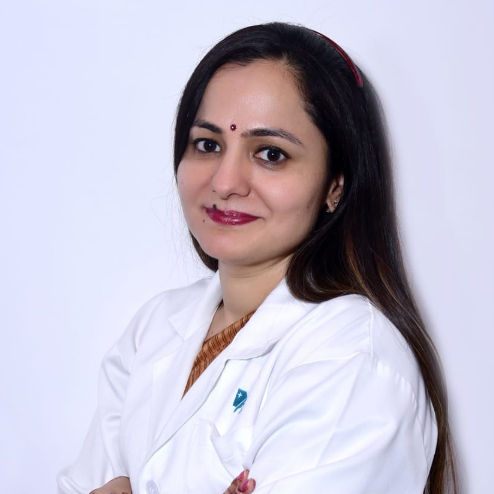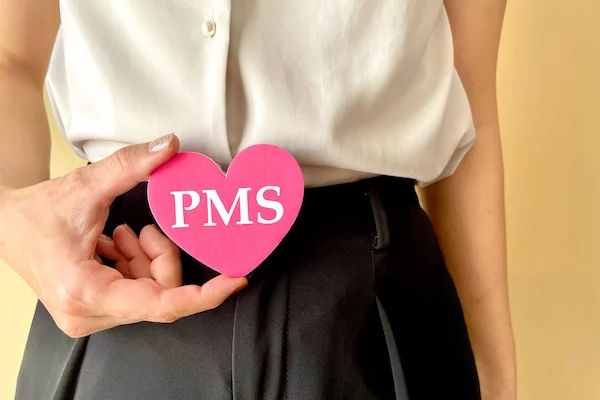Natural PMS Relief Methods
Find out about effective ways to relieve PMS symptoms, including dietary and lifestyle changes for a painless experience and when to get professional help.

Written by
Last updated on 13th Jan, 2026
Premenstrual syndrome, or PMS, is a group of physical, mental, and behavioural signs that women experience during the luteal phase of their cycle, which is usually 10 to 14 days before the start of the period. The signs of PMS are very different for each person. Some common physical signs are bloating in the stomach, aches and pains in the muscles, headaches, and sore breasts. Women may have mood changes, irritability, anxiety, and food cravings when it comes to their emotions and behaviour. So, it is essential to know the methods for relief to ensure a pain-free premenstrual and menstrual period.
Diet and Nutrition for PMS Relief
A healthy, well-balanced diet alleviates PMS symptoms and improves overall well-being. Emphasising specific foods can help regulate mood and manage physical discomfort during the premenstrual phase.
Foods to Include
To alleviate PMS symptoms, a healthy diet is essential. Calcium-rich foods like low-fat milk, cheese, yoghurt, and fortified plant-based alternatives can help reduce depression and mood swings. Consuming foods rich in Vitamin B, such as whole grains, green leafy vegetables, and cereals with added vitamins, may help reduce the risk of developing PMS symptoms. These foods support hormonal balance and overall well-being.
Foods to Avoid
Foods that are high in sugar, salt, and caffeine can make symptoms worse, like gas, restlessness, and anxiety. Cutting back on alcohol and processed foods can help ease symptoms even more.
The Role of Vitamins and Minerals
Calcium and vitamin D help stabilise mood and reduce anxiety, alleviating PMS symptoms. Magnesium aids in easing muscle cramps, bloating, and fatigue, while vitamin B-6 supports mental health and emotional well-being.
Herbal Remedies
Adding herbal treatments to a daily routine can naturally help alleviate PMS symptoms. Turmeric (curcumin), chamomile, and ginger are some herbs that can help with PMS pain because they reduce inflammation. Chaste berry is another well-known plant remedy for balancing hormone changes.
These herbs are natural muscle relaxants that ease cramps and swelling. They may also help the body make serotonin, which boosts happiness and keeps emotions in check.
However, it is essential to consult a doctor before using herbal remedies to ensure they do not interact negatively with other medications. Additionally, ensuring the herbs are of high quality is essential for maximising their effectiveness.
Exercise and Physical Activity
Regular exercise is essential for managing PMS. It can help keep one's mood in check and reduce symptoms. Regular exercise boosts the production of endorphins, dopamine, and serotonin, helping to relax and stabilise mood swings. It also improves blood flow, which can alleviate cramps and discomfort.
Moderate-intensity aerobic activities, such as running, swimming, and brisk walking, can help ease the symptoms of PMS. Yoga is ideal for them as it is low-impact and helps relieve stress.
Doing something active every day for at least 30 minutes can greatly relieve PMS symptoms, especially during the premenstrual phase.
Stress Management Techniques
Managing stress well is essential for lowering PMS symptoms. Here is what women can try:
Meditation and Mindfulness
Meditation and breathing techniques can help individuals manage emotional issues effectively. Mindfulness allows people to concentrate on the present moment, which makes them less irritable.
Yoga and Relaxation Exercises
Child's Pose and Cat-Cow Stretch are gentle yoga poses that can help ease cramps and rest muscles. These habits also help control chemicals that cause stress.
Stress-Relief Strategies
During the PMS phase, engaging in hobbies, journaling, or spending time with loved ones can help manage stress effectively.
The Role of Sleep in PMS Relief
Getting enough restful, high-quality sleep is crucial for maintaining hormonal balance during PMS. It helps the body deal with symptoms like tiredness, irritability and stress. Here are some tips to improve sleep quality:
Creating a sleep routine
Limiting caffeine and sugar intake
Reducing screen time before bed
Practising meditation before sleep
Creating a comfortable bedroom environment
Apart from these, consuming herbal drinks like valerian root or chamomile tea helps promote sleep without causing any adverse effects.
Alternative Therapies
Acupuncture, massage, and aromatherapy are some alternative treatments that can help people with PMS who are looking for extra relief. Here are more details:
Acupuncture: Acupuncture may help with PMS by balancing hormones and boosting energy flow, which can ease cramping and other mental problems.
Massage Therapy: Massage treatment benefits include relaxation, pain relief, and less bloating. Regular lessons before the period can be beneficial.
Aromatherapy: Essential oils like lavender and peppermint, when used in massages or diffusers, can help people rest, feel less stressed, and relieve physical pain.
Keeping a PMS Diary
Tracking symptoms helps individuals identify patterns and causes of their PMS, enabling them to manage and address symptoms more effectively.
What to Track?
Keep track of signs like changes in mood, appetite, and body pain. Every day, write down how long and how bad the symptoms are.
Benefits of Tracking Symptoms
Individuals who keep a PMS journal are more able to recognise patterns and triggers, which in turn improves their ability to make management decisions and communicate with healthcare professionals.
Digital Tools for Tracking
Using apps like Clue and Flo, users can monitor their periods and the symptoms associated with them, which provides vital information for improved management.
When to Seek Professional Help?
Some people with PMS may have severe symptoms that need professional help. One must recognise when to seek help to effectively manage severe conditions.
Signs of Severe PMS
Terrible mood changes, extreme tiredness, irritability, cramping that won't go away, and trouble doing daily tasks are all signs of severe PMS. If these symptoms persist, they could significantly affect their quality of life, and they should see a doctor for proper care.
Treatment Options from Healthcare Providers
Hormonal medicines, antidepressants, and cognitive behavioural therapy are all possible treatments. Sometimes, changing habits alone isn't enough, and medical help may be necessary for improvement.
Collaborative Care
Dietitians, psychologists, and gynaecologists can all work together to provide complete care for women with extreme PMS.
Conclusion
Managing PMS requires a comprehensive approach, including dietary changes, regular exercise, stress management, adequate sleep, and alternative therapies. These natural remedies can alleviate symptoms and improve overall well-being. By making small, consistent lifestyle adjustments, individuals can experience significant relief from PMS symptoms and enhance their overall health and quality of life. So, by putting themselves first and starting healthy habits, women can have better physical and mental health during their periods.
Consult Top Obstetrics and gynaecologist
Consult Top Obstetrics and gynaecologist

Dr. Sushma Prasad Sinha
Obstetrician and Gynaecologist
35 Years • MBBS, MD, MRCOG., FRCOG., FICOG, FIMSA
Delhi
Apollo Hospitals Indraprastha, Delhi
(50+ Patients)

Dr. Swetha P
Obstetrician and Gynaecologist
11 Years • MBBS, MS(OBGY)
Hyderabad
Apollo Hospitals Jubilee Hills, Hyderabad
(50+ Patients)

Dr. Vidya Konduri
Obstetrician and Gynaecologist
9 Years • MS
Chinagadila
Apollo Hospitals Health City Unit, Chinagadila
(50+ Patients)

Dr. Antharvedi Santhi
Obstetrician and Gynaecologist
15 Years • MBBS Ms(obstetrics and gynaecology)
Hyderguda
Apollo Hospitals Hyderguda, Hyderguda

Dr. Rupali Goyal
Obstetrician and Gynaecologist
20 Years • MBBS, DNB (OBGYN), Dip (Usg)
Delhi
Apollo Hospitals Indraprastha, Delhi

